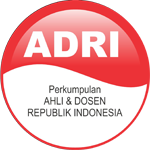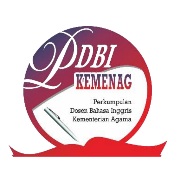Strategies in Online Speaking Classroom in the Time of Covid-19: A Descriptive Study at Tertiary Level
Abstract
Recently, the Covid-19 pandemic has transformed teaching and learning into a virtual model, which demands teachers to find their best strategy. This study aims to analyze the strategies applied by teachers at the tertiary level in the time of Covid-19. The researchers employed a descriptive research design conducted in one of the Islamic universities at Bengkulu. The subjects were two English as a foreign language (EFL) teaching staff who taught speaking skills at the beginner level. The data was obtained through a semi-structured interview. The observation was also done during one semester, where the researchers took part in the online classrooms. After the data was collected, the researchers analyzed the data by following some steps: (1) data reduction, (2) data display, and (2) conclusion drawing/verification. The findings revealed that the English teachers used several teaching-speaking skills integrated with social media and mobile phone applications to be accessed easily. The strategies are lecturing, role-play, online group discussion, simulation, and drilling. They are blended with WhatsApp Group, Google Classroom, Zoom, and Instagram. Even though the learning process can be managed in this pandemic, face-to-face learning is still favorable.
Keywords
Full Text:
PDFReferences
Ballman, T. L., & Larsen-Freeman, D. (1988). Techniques and Principles in Language Teaching. The Modern Language Journal, 72(2), 216. https://doi.org/10.2307/328245
Belecina, Rene R; Ocampo, J. J. (2018). Effecting Change on Students?? Critical Thinking in Problem Solving. Educare, 10(2), 109–118.
Brown, Douglas, H. (2000). Principles of Language Learning and Teaching. Pearson Longman.
Espino-d, L., & Fernandez-caminero, G. (2020). Analyzing the Impact of COVID-19 on Education Professionals . Toward a Paradigm Shift : ICT and Neuroeducation as a Binomial of Action. 1–10.
Foshay, A. . (1975). Teaching Tactics, Teaching Strategy. Educational Leadership, 3, 373–375.
Gao, F. (2014). Exploring the use of discussion strategies and labels in asynchronous online discussion. Journal of Asynchronous Learning Network, 18(3), 1–19. https://doi.org/10.24059/olj.v18i3.460
Hadi, M. S. (2015). Games as The Strategy in Teaching Speaking for young Learners. June 2015.
King, F. B. (2001). Defining Distance Learning and Distance Education. January.
Kistner, S., Rakoczy, K., Otto, B., & Klieme, E. (2015). Teaching learning strategies : The role of instructional context and teacher beliefs. Journal for Educational Research Online, 7(1), 176–197. http://www.j-e-r-o.com/index.php/jero/article/download/542/228
Mishra, L., Gupta, T., & Shree, A. (2020). International Journal of Educational Research Open Online teaching-learning in higher education during lockdown period of COVID-19 pandemic. International Journal of Educational Research Open, 1(August), 100012. https://doi.org/10.1016/j.ijedro.2020.100012
Moerti, W. (2021). Data Terkini Covid-19 di Indonesia Januari 2021. Merdeka.Com. https://www.merdeka.com/peristiwa/data-terkini-covid-19-di-indonesia-januari-2021.html
Naser, A., & Almutairi, M. (2015). The Effect of Using Brainstorming Strategy in Developing Creative Problem Solving Skills among male Students in Kuwait : A Field Study on Saud Al-Kharji School in Kuwait City. 6(3), 136–146.
Saputri, Y. A., Rizal, S., & Afriani, Z. L. (2021). An Analysis on English Teacher Strategies in Teaching Reading Comprehension. Jadila: Journal of Development and Innovation in Language and Literature Education, 1(3), 353-361. https://doi.org/10.52690/jadila.v1i3.125
Saykılı, A. (2018). Distance Education : Definitions , Generations , Key Concepts and Future Directions. International Journal of Contemporary Educational Research, 5(1), 1–17.
Syahrial, Asrial, Kurniawan, D. A., & Subandiyo, M. (2019). Pedagogic competence and Indonesian language competence pre-service teacher of elementary program. International Journal of Scientific and Technology Research, 8(10), 851–856.
Vlachopoulos, D., & Makri, A. (2017). The effect of games and simulations on higher education: a systematic literature review. In International Journal of Educational Technology in Higher Education (Vol. 14, Issue 1). International Journal of Educational Technology in Higher Education. https://doi.org/10.1186/s41239-017-0062-1
DOI: http://dx.doi.org/10.29240/ef.v5i2.2613
Refbacks
- There are currently no refbacks.
Copyright (c) 2021 Zelvia Liska Afriani, Valisneria Utami

This work is licensed under a Creative Commons Attribution-NonCommercial-ShareAlike 4.0 International License.
INDEXED BY:
 This work is licensed under a Creative Commons Attribution-NonCommercial-ShareAlike 4.0 International License
This work is licensed under a Creative Commons Attribution-NonCommercial-ShareAlike 4.0 International License
@ ENGLISH FRANCA : Academic Journal of English Language and Education
Jl. Dr. AK Gani No 1 Dusun Curup, Rejang Lebong Regency, Bengkulu Province, Indonesia, 39119.
Dr. Eka Apriani, M.Pd., email: efranca@iaincurup.ac.id, eka.apriani@iaincurup.ac.id.




.png)












